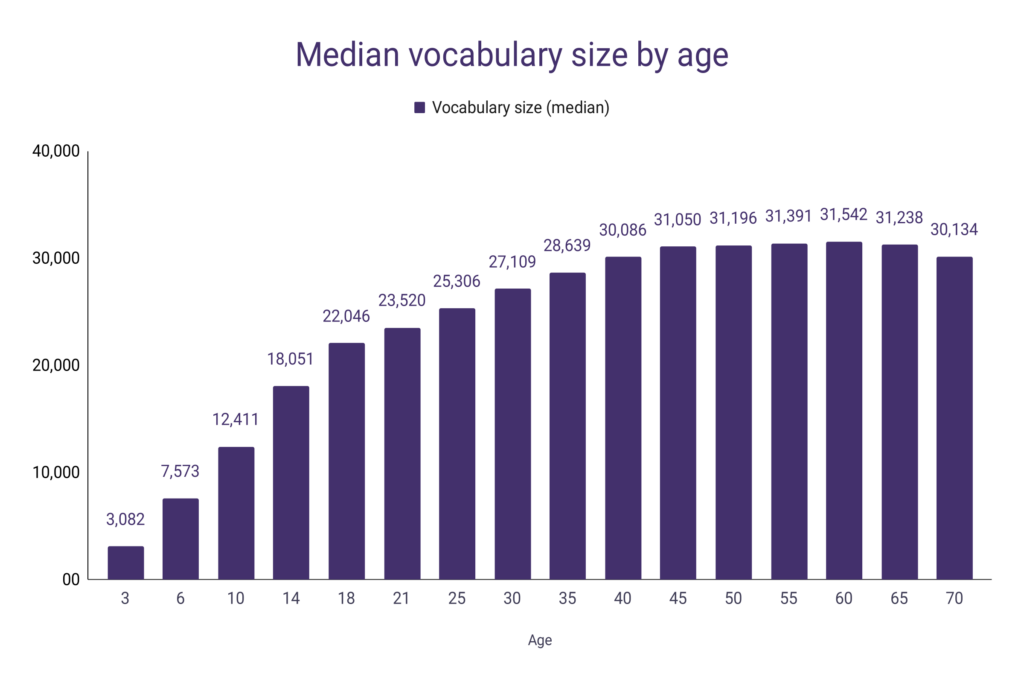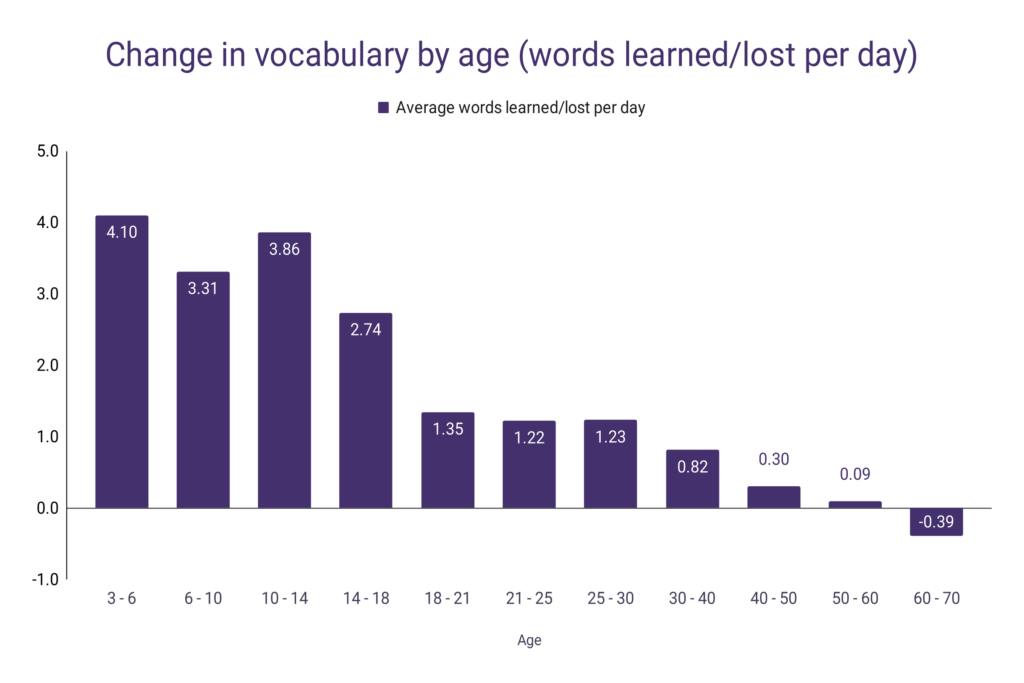This report analyzed the number of English words that American and foreign English-speaking citizens possess in their vocabulary. Along with the averages, the report provides breakdowns by age, shows the growth of vocabulary over the years, and analyzes the age period when a person’s vocabulary grows the most/least.
Highlights:
- The average American, who is 39 years old, possesses around 29,851 words in their vocabulary.
- By the age of 3, median vocabulary stands around 3,000 words, and by the age of 10 it grows to over 12,411 words.
- The vocabulary peaks at age 59 at close to 32,000 words and starts declining after the age of 65.
- Children between ages 3 and 6 can learn more than 4 new words per day, on average.
- Vocabulary is greatly impacted by people’s reading habits, as those who read frequently can possess more than 40% more words in their vocabulary compared to sporadic readers.
- Almost half of non-native English speakers know between 2,500 and 8,500 words.
How many English words does the average American know?
- The vocabulary of the average American (39 years old) stands at around 29,851 words.
- At age 3, children can recognize around 3,082 words.
- By the time they enter elementary school, children possess around 7,573 words in their vocabulary.
- At middle school age, at 10 years old, children can recognize around 12,411 words. This means that from age 6 to age 10, children’s vocabulary increases by 63.88%.
- When entering high school at 14 of age, students possess more than 18,051 words in their vocabulary, 45.44% compared to the first year of middle school.
- By the time they’re 18 years old, the average person knows over 22,046 words, a 22.13% increase in vocabulary compared to the beginning of high school days.
- After the age of 20, vocabulary growth begins to normalize, increasing between 5% and 7% every 5 years until the age of 40.
- The average person knows the most words around the age of 59 when the vocabulary consists of 31,955 words.
- After the age of 45, the increase of words in a person’s vocabulary is marginal, hovering around 0.5% until the age of 65.
- People usually start forgetting words after the age of 65, and by the age of 70 the amount of words a person recognizes drops down to 30,134.
| Age | Vocabulary size (median) | Growth |
| 3 | 3,082 | |
| 6 | 7,573 | 145.72% |
| 10 | 12,411 | 63.88% |
| 14 | 18,051 | 45.44% |
| 18 | 22,046 | 22.13% |
| 21 | 23,520 | 6.69% |
| 25 | 25,306 | 7.59% |
| 30 | 27,109 | 7.12% |
| 35 | 28,639 | 5.64% |
| 40 | 30,086 | 5.05% |
| 45 | 31,050 | 3.20% |
| 50 | 31,196 | 0.47% |
| 55 | 31,391 | 0.63% |
| 60 | 31,542 | 0.48% |
| 65 | 31,238 | -0.96% |
| 70 | 30,134 | -3.53% |

- Between ages 3 and 6, the average child learns around 4,491 new words, which equates to learning 4.1 new words per day over the course of 3 years.
- During the elementary school years, between 6 and 10 years of age, the average child learns around 3.31 new words daily, adding 4,838 new words to their vocabulary.
- People continue adding more than one word per day to their vocabulary (on average) until the age of 30, after which the addition rate decreases.
- Between ages 50 and 60, the average American’s vocabulary stagnates, adding only around 0.09 new words per day.
- After that, the average person starts losing some words from their vocabulary – at the rate of 0.39 lost words per day between ages 60 and 70.
| Age | New words learned/lost | Words learned/lost per day |
| 3 – 6 | 4,491 | 4.10 |
| 6 – 10 | 4,838 | 3.31 |
| 10 – 14 | 5,640 | 3.86 |
| 14 – 18 | 3,995 | 2.74 |
| 18 – 21 | 1,474 | 1.35 |
| 21 – 25 | 1,786 | 1.22 |
| 25 – 30 | 1,803 | 1.23 |
| 30 – 40 | 2,977 | 0.82 |
| 40 – 50 | 1,110 | 0.30 |
| 50 – 60 | 346 | 0.09 |
| 60 – 70 | -1,408 | -0.39 |

Impact of reading on people’s vocabulary
Reading, especially reading fiction books, can significantly increase the number of words a person possesses in their vocabulary. This is especially important during childhood, when the difference in vocabulary between kids who don’t read much and those who read a lot can have a lasting effect in the future:
- People who declared that they read “occasionally” possess a vocabulary of around 25,000 words on average.
- This improves to the 27,000-31,000 range for people who read “a lot”.
- This difference is attributed to the amount of fiction books that avid readers consume.
- People who read a lot but rarely read fiction possess a vocabulary of 27,344 words, on average.
- Regular readers who read fiction more regularly have an increased vocabulary, standing at around 29,495 words.
- People who say that they read a lot and read fiction a lot can possess around 31,283 words in their vocabulary.
- This is a good indicator that reading fiction can have a massive impact on a person’s vocabulary, more than other categories of books.
| Reading frequency | Fiction reading frequency | Average vocabulary (words) |
| A lot | A lot | 31,283 |
| A lot | Somewhat | 29,495 |
| A lot | Not much | 27,344 |
| Somewhat | Somewhat | 25,662 |
| Somewhat | Not much | 24,632 |
Word games, such as WordsRated’s Anagram Solver, are excellent ways of increasing a person’s vocabulary. It is a great way of getting the most words out of any given combination of letters, such as 6-letter anagrams.
The average 4-year-old knows around 4,845 words. Between age 4 and 15, depending on the amount of books they read, children’s vocabulary evolves with huge variance:
- Children who read “a lot” between ages 4 and 15 learn around 4.1 new words per day, on average. By the time they turn 15, these children will possess around 21,307 words in their vocabulary.
- At the same time, children who say they read occasionally will increase their vocabulary by 2.6 words per day, on average, and will have around 15,284 words in their vocabulary by the age of 15. This is 40% fewer words in their vocabulary compared to the regular readers.
- On the other hand, children who don’t read often will learn only around 1.4 words per day, on average, between ages 4 and 15. At the age of 15, these children will have around 10,466 words in their vocabulary, which is 46% fewer compared to occasional readers and 103% less than frequent readers.
| Reading habits | Vocabulary growth between ages 4 and 15 | Vocabulary (4 YO) | Average vocabulary (15 YO) |
| Read “lots” | 4.1 words/day | 4,845 | 21,307 |
| Read “somewhat” | 2.6 words/day | 4,845 | 15,284 |
| Read “not much” | 1.4 words/day | 4,845 | 10,466 |
How many words do non-native English speakers know?
- Almost half, 47.8% to be precise, of non-native English speakers possess between 2,750 and 8,750 words in their vocabulary.
- 30.8% of them know between 8,750 and 20,750 English words.
- Only 9.2% of non-native speakers have more than 20,000 words in their English vocabulary.
- Additionally, 6% of non-native speakers recognize less than 2,750 words.
| Vocabulary size | Share of non-native speakers |
| 750 – 2750 | 6.00% |
| 2750 – 4750 | 17.30% |
| 4750 – 6750 | 16.90% |
| 6750 – 8750 | 13.60% |
| 8750 – 10750 | 9.00% |
| 10750 – 12750 | 6.10% |
| 12750 – 14750 | 4.70% |
| 14750 – 16750 | 4.00% |
| 16750 – 18750 | 3.70% |
| 18750 – 20750 | 3.30% |
| 20750 – 22750 | 2.70% |
| 22750 – 24750 | 2.20% |
| 24750 – 26750 | 1.80% |
| 26750 – 28750 | 1.60% |
| 28750 – 30250 | 0.90% |


